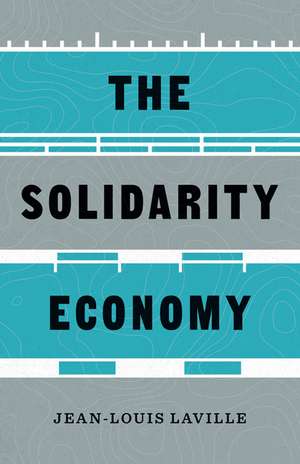The Solidarity Economy: Diverse Economies and Livable Worlds
Autor Jean-Louis Laville Traducere de Josh Boothen Limba Engleză Paperback – 22 aug 2023
Questioning the boundaries between politics and economics
Jean-Louis Laville’s large body of work has focused on an intellectual history of the concept of solidarity since the Industrial Revolution. In The Solidarity Economy, his most famous distillation of this work, Laville establishes how the formations of economic solidarities (unions, activism, and other forms of associationalism) reveal that the boundaries between politics and economics are porous and structured such that politics, ideally a pure expression of ethics and values, is instead integrated with economic concerns.
Exploring the possibilities and long histories of association, The Solidarity Economy identifies the power of contemporary social and solidarity movements and examines the history of postcapitalist practices in which democratic demands invade the heart of the economy. The Solidarity Economy ranges in focus from workers associations in France dating back to the nineteenth century, to associations of African Americans and feminists in the United States in the late nineteenth and early twentieth centuries, to a Brazilian landless-worker coalition in the twentieth century.
Studying solidarity associations over time allows us to examine how we can recombine the economic and political spheres to address dependencies and inequalities. Ultimately, The Solidarity Economy has global scope and inspiring examples of associations that deepen democracy.
Jean-Louis Laville’s large body of work has focused on an intellectual history of the concept of solidarity since the Industrial Revolution. In The Solidarity Economy, his most famous distillation of this work, Laville establishes how the formations of economic solidarities (unions, activism, and other forms of associationalism) reveal that the boundaries between politics and economics are porous and structured such that politics, ideally a pure expression of ethics and values, is instead integrated with economic concerns.
Exploring the possibilities and long histories of association, The Solidarity Economy identifies the power of contemporary social and solidarity movements and examines the history of postcapitalist practices in which democratic demands invade the heart of the economy. The Solidarity Economy ranges in focus from workers associations in France dating back to the nineteenth century, to associations of African Americans and feminists in the United States in the late nineteenth and early twentieth centuries, to a Brazilian landless-worker coalition in the twentieth century.
Studying solidarity associations over time allows us to examine how we can recombine the economic and political spheres to address dependencies and inequalities. Ultimately, The Solidarity Economy has global scope and inspiring examples of associations that deepen democracy.
Preț: 215.66 lei
Nou
Puncte Express: 323
Preț estimativ în valută:
41.27€ • 42.98$ • 34.88£
41.27€ • 42.98$ • 34.88£
Carte disponibilă
Livrare economică 17 februarie-03 martie
Livrare express 31 ianuarie-06 februarie pentru 31.13 lei
Preluare comenzi: 021 569.72.76
Specificații
ISBN-13: 9781517913601
ISBN-10: 1517913608
Pagini: 336
Ilustrații: 4 black and white illustrations
Dimensiuni: 140 x 216 x 41 mm
Greutate: 0.48 kg
Editura: University of Minnesota Press
Colecția Univ Of Minnesota Press
Seria Diverse Economies and Livable Worlds
ISBN-10: 1517913608
Pagini: 336
Ilustrații: 4 black and white illustrations
Dimensiuni: 140 x 216 x 41 mm
Greutate: 0.48 kg
Editura: University of Minnesota Press
Colecția Univ Of Minnesota Press
Seria Diverse Economies and Livable Worlds
Notă biografică
Jean-Louis Laville is professor at the National Conservatory of Arts and Crafts in Paris, where he holds a chair in Solidarity Economy. He is author and editor of several books, most recently Theory of Social Enterprise and Pluralism: Social Movements, Solidarity Economy, and Global South; Civil Society, the Third Sector, and Social Enterprise: Governance and Democracy; The Human Economy; and The Third Sector in Europe.
Recenzii
"The practices that can carry us toward a plural economy and a plural democracy already exist; the question is what kind of social change they can bring about." —from the Conclusion








